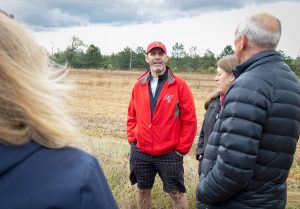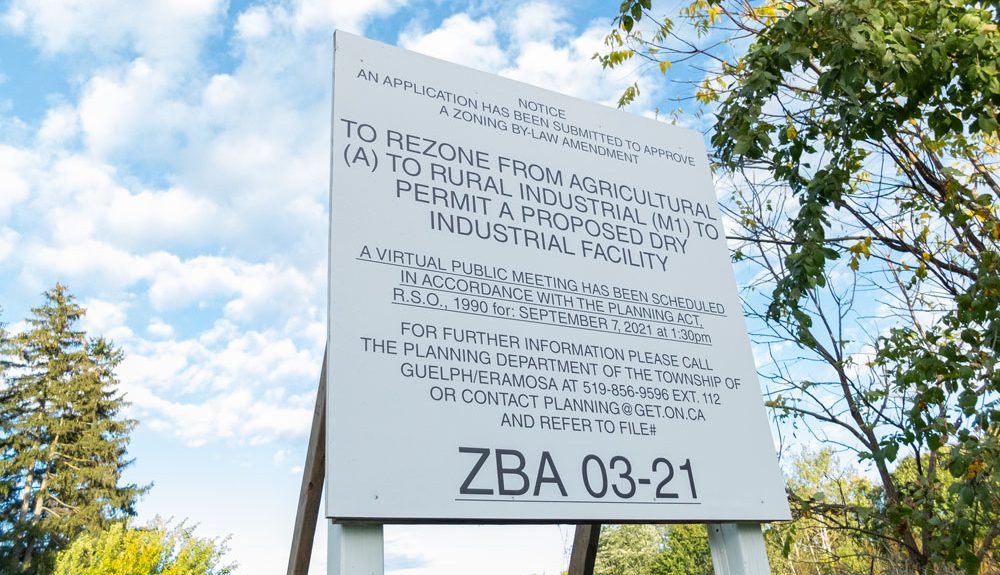GUELPH/ERAMOSA – After township council approved the rezoning of a Jones Baseline property for a large manufacturing plant, area residents are plotting their next course of action to stop the business from setting up shop in the area.
In November, Guelph/Eramosa council approved Minus Forty’s rezoning for a controversial fridge and freezer manufacturing plant, so long as several conditions are met.
The 27.8 acres of land, located at 5063 Jones Baseline, southeast of Highway 7 between Rockwood and Guelph, was rezoned from agricultural to rural industrial land.
In response to councils’ decision, the Jones Baseline Community Inc. group, made up of area residents opposed to the development and represented by Donnelly Law, recently submitted an appeal to the Ontario Land Tribunal.
Local resident and group member Jon Pigozzo said now it’s just a waiting game.
“Our main hope, and we know it’s not a great hope, is that the Ontario Land Tribunal would overrule the rezoning and they’ll see the mistakes and the long-term consequences that this is going to have in the community and in the neighbourhood,” Pigozzo explained in an interview with the Advertiser.
Two main issues the group is hoping to address through the appeal, submitted on Dec. 8, is the facility’s classification and the designation for rural employment listed in the Wellington County Official Plan, which Pigozzo noted constitutes “poor planning.”
The proposed plant is currently set as a “class one” facility, however, because of its size, operational hours and potential noise that will be audible off site, it should be classified as at least a class two manufacturing facility, opponents say.
“It just feels like the whole thing was rushed through when its impacts are now there for generations,” Pigozzo explained.
“If you build this factory, you’re never going to be using that land for farmland ever again,” he added. “When you build that factory, you’re not building any more homes in that area, ever.”
The designation classification is one issue the appeal focuses on, Pigozzo explained. “Poor planning aspects” is the other.
Pigozzo noted the designation, which was marked nearly 30 years ago, has been grandfathered through and wouldn’t have even been considered today.
“Wouldn’t you look at the standards of today and what today’s surrounding area is?” Pigozzo asked. “It’s a great example of poor planning, when right away, your factory needs to put up a three-meter wall that’s a hundred feet long to try and cut down on noise that’s going to hit the residents that are directly across the street.
“That just shows poor planning when you have to go to those extremes to try and fit a factory on a piece of land.”
While the land is designated as a “rural employment area” in the County of Wellington Official Plan, which means it’s been “set aside for industrial and limited commercial uses which would benefit from a rural location,” Pigozzo said the designation is largely outdated.
“There’s multiple other sections throughout the official plan, which basically say you shouldn’t be putting a factory within one kilometre of a hamlet,” he said, adding “well, it’s inside of our official hamlet.”

Jon Pigozzo from the Jones Baseline Community Group spoke to concerned Guelph/Eramosa residents about the nearby fridge and freezer manufacturing facility on Oct. 17. Photo by Jordan Snobelen
Pigozzo noted the question during the November council meeting shouldn’t have been “could” the factory fit on the land, but rather “should” it.
“Council basically followed an archaic designation that wouldn’t be allowed today and hid behind it rather than doing the right thing and correcting this 30-year-old mistake,” he explained.
Pigozzo said mediation is what the local group is hoping for at a minimum, meaning Minus Forty will consult with the neighbourhood in potential ways to minimize impacts – the main ones being traffic, noise and lighting.
In the meantime, Pigozzo said the group is working with Wellington Water Watchers to find potential avenues to pursue. As a non-profit group, they’ve also set up a change fund to aid in covering costs.
At this time, the group will be waiting to hear back from the tribunal, as well as waiting for more information with regards to holding provisions put on the rezoning as a condition of council approval, which he noted were somewhat vague.
Pigozzo said best case scenario through the appeal would be to halt operations.
“That’s what our hope is … that they realize the mistake in keeping that designation there for the last 30 years, and how that designation wouldn’t even be allowed today,” he said.
“Especially the culture we live in today, where you look back at the mistakes made in the past 30 years ago when they made that designation, … we’ve learned so many things since then.
But, he added, the worst case the group is hoping for is that they can get to mediation and discuss how to minimize the impacts.
“Nobody wants it,” Pigozzo said. “Nobody wants a factory in the middle of their residential neighbourhood.
“That’s why you have industrial parks and you have subdivisions. Separate those land uses.”




